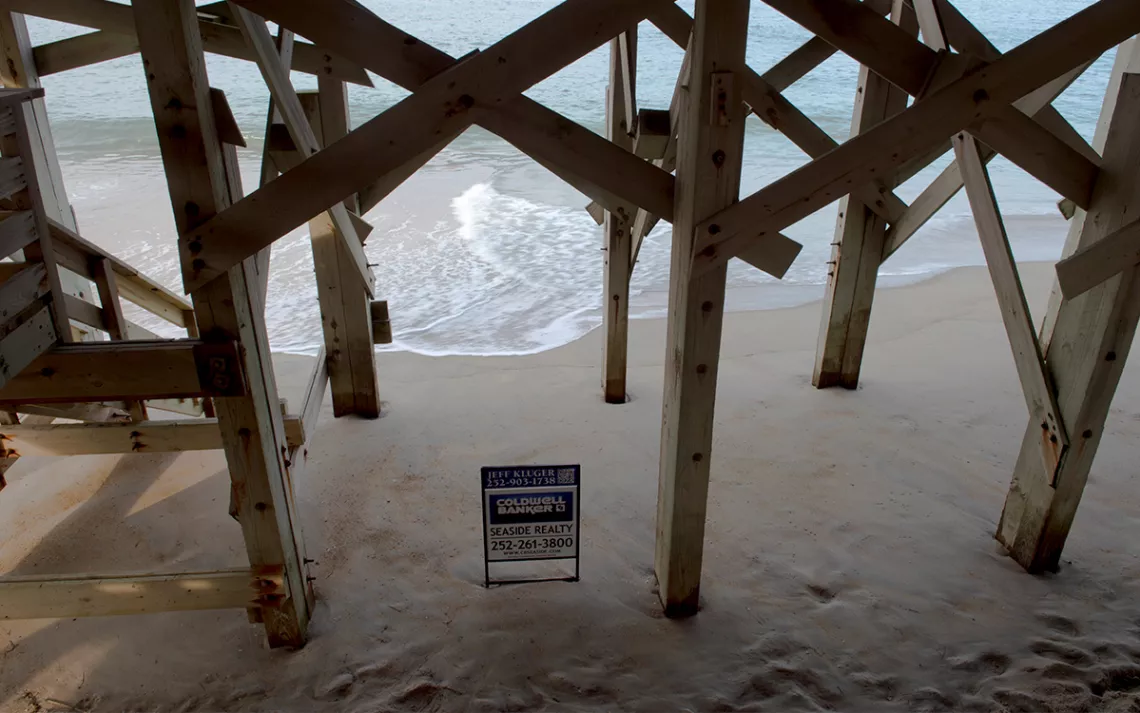Is Climate Change Coming for Your Home?
The 30-year mortgage could soon be underwater—literally

Development continues to flourish on the Outer Banks in North Carolina as the shoreline is lapped up by waves. | Photo by Nikki Kahn
The statistic is almost beyond belief: Last year, an estimated 3.3 million American adults were displaced due to natural disasters, according to the US Census Bureau. Wildfires, floods, tornadoes, and, above all, hurricanes drove more than 1 percent of Americans from their homes. While a third of those were displaced for only about a week, some half a million people never returned home.
You'd think such numbers would serve as (yet another) wake-up call that climate chaos is making it unsafe to live in certain places. Instead, Americans continue to flock to the most climate-change-threatened locales in the nation. Hurricane-prone Florida, the drought-stressed Southwest, and the forested, fire-threatened Mountain West remain among the hottest housing markets in the country (see Darby Minow Smith's take on what's happening in Montana, "Montana Has a Habitat Problem").
Combine the intensifying climate dangers with people's desire to live in places with (mostly) nice weather or (until wildfires rip through) lovely views, and you can see this is a blueprint for trouble. Climate change is on a collision course with the most sacrosanct of American conventions: the single-family home and the 30-year mortgage.
As Amanda Abrams reports in "How Climate Change Could Sink the US Real Estate Market," real estate market insiders are warning about how climate chaos threatens the US housing market. Some worry that a climate disaster could spark a housing market meltdown on par with the 2008 financial crash. "There's real uncertainty, but the number of mortgages in default could be as large as [in] the subprime crisis," a professor at the University of Pennsylvania's Wharton School told Abrams.
Perhaps the most obvious threat is a mega-storm that destroys enough homes to trigger a crisis for insurance companies and government-backed lenders like Fannie Mae and Freddie Mac. Another danger is what Abrams calls "a slow spiral of decline." If—or when—temperatures become unbearable in Phoenix or sunny-day flooding becomes insufferable in Miami, those real estate markets could start to contract. People might head for the exits, causing housing prices to collapse, in which case no one will be made whole—since homeowner's insurance doesn't cover such events.
In either scenario, the poorest homeowners will be the ones to suffer first and worst. This is already starting to play out in Florida, where the cost of homeowner's insurance is three times the national average. Think of it as climate gentrification: The affluent will mostly be able to ride out the storms from the high ground of their assets, while lower-income households could find their homes financially (if not literally) underwater.
In many ways, this predicament is a market failure, since government policies actually incentivize home building in risky places. It's also a failure of imagination, evidence of how easy it can be for many of us to succumb to the magical thinking that climate change will impact someone else, over there. Above all, climate change's risk to our homes will be a test of our empathy and capacity for collective action.
Our homes, after all, aren't just assets. For most of us, they are an abode of the heart—the site of our fondest memories, our greatest joys, our deepest feelings of belonging. While climate-risk experts counsel that some seaside communities need to prepare for what's called "managed retreat," such bloodless language elides the fact that retreat will feel like a surrender of our most beloved places. This may be one of the greatest challenges of the climate change era: how to build community, cultivate love of place, and make a home on a planet that is becoming ever more inhospitable.
 The Magazine of The Sierra Club
The Magazine of The Sierra Club



